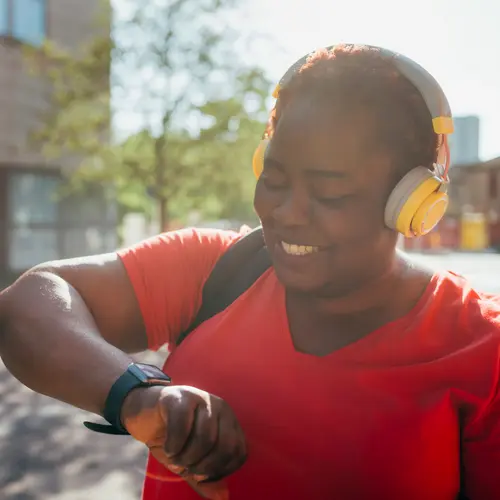When you have diabetes, a primary goal is to keep it under control. Here are some simple things you can do each day to help achieve that goal.
Exercise
Regular physical activity helps you feel better. It also improves your sensitivity to insulin, which means it works better in your body. Because it does, your blood sugar levels can become more stable.
Exercise can also help ease stress.
If you aren't active now, start slow. Then build up how much exercise you get over time. Shoot for four to seven periods of activity each week. Try to make each period last for at least 30 minutes. And you don't have to work out at the gym to be active. Take the stairs instead of an elevator, or park at the far end of the lot. Both add exercise to your daily routine.
Have a realistic goal and make a plan. What exercises will you do, and when will you do them? For example, you might plan to walk 30 minutes most days on your lunch break.
Change your activities often enough so you don't get bored. You can do aerobic activities like walking or jogging. And resistance exercises like working out with weights offer another option. Whatever you do, don't forget to stretch before and after each workout session.
It's important to realize that exercise lowers your blood sugar. Talk to your doctor about whether you need to adjust your meds or insulin dose to keep your levels high enough.
Eat a Well-Balanced Diet
Having diabetes shouldn't keep you from enjoying a bunch of different foods.
Try to fill half your plate with non-starchy vegetables such as:
Also, make sure to get some of these:
- Beans
- Berries
- Citrus fruits
- Lean meat
- Low-fat or non-fat dairy products
- Nuts
- Poultry or fish
- Sweet potatoes
You can also get protein from vegetarian things like tofu.
Stick to whole-grain foods. If you eat cereals, check the ingredients and make sure whole grain is first on the list.
Examples of whole grains include:
- Brown rice
- Bulgur (cracked wheat)
- Millet
- Popcorn
- Quinoa
- Sorghum
- Whole-oats oatmeal
- Whole wheat
Eat three meals a day, and try to space them out evenly. You should also aim to have the same amount of carbs at each meal.
In general, less-processed food is better. That's because it has a lower glycemic index, which means it may have less of an effect on your blood sugar. For example, oatmeal from whole oats has a lower glycemic index than instant oatmeal.
If you have type 2 diabetes and follow a healthy diet and exercise routine, you could lose weight and improve your diabetes. One study found long-term weight loss through diet and exercise could lower your chances of having a stroke and dementia.
Reduce Stress
If you're stressed, you may exercise less, drink more, and not watch your diabetes as closely.
Stress can raise your blood sugar and make you less sensitive to insulin. When you're stressed, your body adopts a "fight or flight" response. That means it will make sure you have enough sugar and fat available for energy.
Studies of people with type 1 diabetes found blood sugar levels go up for most people under mental stress and down for others. If you have type 2 diabetes and you're feeling pressure, your glucose will go up.
If something has you bothered, try to make changes that can help you relax. You might exercise, spend time with friends, meditate, or replace negative thoughts with positive ones. Do whatever works for you.
Support groups, counseling, or therapy can help, too.
Quit Smoking
Kick the habit. It'll give you better control of your blood sugar levels.
If you smoke, you're also more likely to have serious health problems as well as a higher chance for complications from diabetes. Those can include:
- Heart and kidney disease
- Poor blood flow to the legs and feet, which could lead to infections, ulcers, and amputation of your toes or feet
- Retinopathy, an eye disease that causes blindness
- Peripheral neuropathy, nerve damage in the arms and legs that causes weakness, numbness, pain, and poor coordination
Cut Back on Alcohol
If you're on insulin or oral diabetes meds like sulfonylureas or meglitinides, drinking alcohol can drop blood sugar to dangerous levels. When you drink, your liver has to work to remove the alcohol from your blood instead of regulating your blood sugar.
Drunkenness and low blood sugar can also cause dizziness, confusion, and sleepiness. You could confuse the symptoms of too much alcohol and low blood sugar. A woman should have no more than one drink a day. For men, the limit is two drinks per day. One drink is 12 ounces of beer, a 5-ounce glass of wine, or an ounce and a half of liquor like vodka. With mixed drinks, choose no-calorie mixers like club soda or diet soda.
Try switching to a light beer or wine spritzer. You can also sip more slowly or switch to water or another calorie-free drink.
If you cut back on the drinks, you may eat better. Alcohol can lower your willpower to resist overeating.
Take Notes
Keeping a detailed daily log can help you track what affects your glucose levels. That log can include:
- Insulin and other medications
- Food, especially carbs
- Physical activity
- Stress
- Illnesses
After a week or so, see if you notice any patterns.
If you're trying to lose weight, write down everything you eat or drink for a week or two, including portion size. That'll give you a clear picture of where you stand and what changes you can make.
If you drink alcohol, check your blood sugar before you drink, while you drink, before you go to bed, and the following day. Alcohol lowers blood sugar for up to 24 hours after you finish your last drink.

